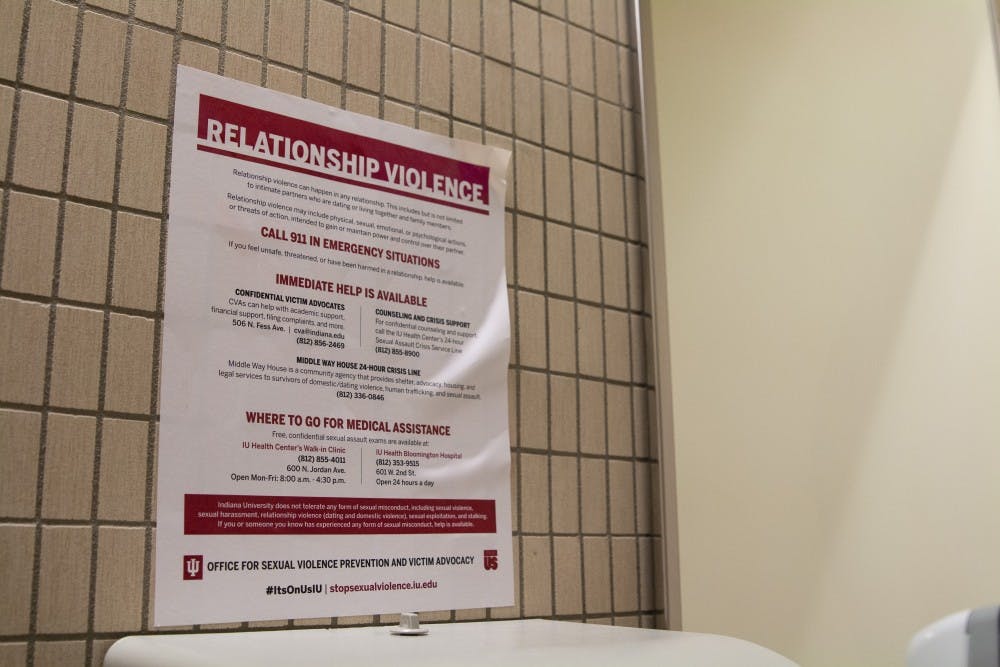A Sexual Misconduct Student Working Group has released its recommendations regarding the sexual misconduct policy at IU.
Some findings include suggesting mandatory “It’s On Us” training and changing IU policy to explicitly prohibit tampering with preventative and emergency contraceptive devices.
Chaired by members of IU Student Government and Culture of Care, the group formed six prevention recommendations, two policy recommendations and four procedure recommendations.
The group officially formed in August and included representatives from six organizations including IUSG, Culture of Care, Shatter the Silence, Student Recreational Sports Association, "It's On Us" and Residential Assistants to look at policy, procedure and prevention, said Isabel Mishkin, IU Student Government chief of staff and one of the chairs of the group.
“Advocating, supporting and listening to the voices of survivors and allies was our central focus throughout the write-up process,” said Maddie Dederichs, one of the chairs of the working group. “With our 12 recommendations, we have the opportunity as IUSG to make a difference on this campus.”
The breakdown of the recommendations is telling of the purpose and mission of the group, Mishkin said.
Prevention
“We’re really focused on the prevention piece because so much of understanding and addressing sexual misconduct has to come from changing our culture and changing the way we educate students,” Mishkin said.
Right now, students attend “It’s On Us” training to learn about sexual misconduct and how to prevent it, but it’s not mandatory. Students are also required to complete an education program about consent through MyStudentBody.
The group found the MyStudentBody program is not especially helpful or effective in its instruction, according to the recommendations.
It also suggested making "It’s On Us" mandatory, and creating a different "It’s On Us" format for survivors.
Other proposals included:
Improved education before beginning college
Additional prevention efforts for upperclassmen
The implementation of a male counselor for Sexual Assault Crisis Services and Confidential Victim Advocates and
More explicit outlines of the abilities of CVAs.
“Let’s start at the root of the problem,” Mishkin said.
Policy
The group also examined the written policy for sexual misconduct processes.
“As much as it is about the culture, it’s also about the policies and the words that are in the policies,” Mishkin said.
The group’s policy recommendations include delineating between intoxication and incapacitation to ensure students know that incapacitation is a state beyond intoxication that affects decision-making and consent. It also recommends explicitly making tampering with preventative and emergency contraceptive devices misconduct under IU policy.
Currently, non-consensual contraceptive tampering, such as the removal of a condom during sex, does not clearly constitute sexual misconduct under IU policy. It is possible that tampering with contraceptives could be considered sexual harassment under the current policy, but the definitions are vague in defining whether these actions violate policy, the recommendations state.
“We’re already making progress with some of the recommendations,” Mishkin said. “Our two policy recommendations would substantially change the sexual misconduct policy therefore they need to go to the university faculty council and we want to get it to them before the UFC meeting in April.”
Procedure
The Sexual Misconduct Student Working Group included four procedural recommendations and requests in its findings.
Currently, an appeal from a sexual misconduct case must be filed within five days of the written decision of the sexual misconduct hearing is sent. The working group wants to extend this to ten business days to allow students adequate time to seek legal counsel.
It also recommends an established procedure for notifying claimants who transfer to other IU campuses when an alleged aggressor also transfers to that campus.
Other procedural recommendations include:
The publishing and accessibility of an outline of what training panelists who sit on panels to hear cases of sexual misconduct undergo in order to increase trust in the procedure and
Allowing graduate students volunteer to become panelists in sexual misconduct hearings. Right now, panelists are only faculty and staff.
The group sent their recommendations to the provost, the vice provost, the Office for Institutional Equity, the Office of Student Conduct, the Office of Sexual Violence Prevention and Victim Advocacy and representatives from the IU Health Center, among others.
“I hope that we can continue having these substantive conversations,” Mishkin said. “I hope that when administrators are making decisions that impact students, students are in the room.”
Dederichs said she also hopes the conversation can continue.
“Sexual misconduct is prevalent on campuses all across the nation and through discussion and dialogue I hope for students to better understand the definition of consent and bystander intervention,” she said.




